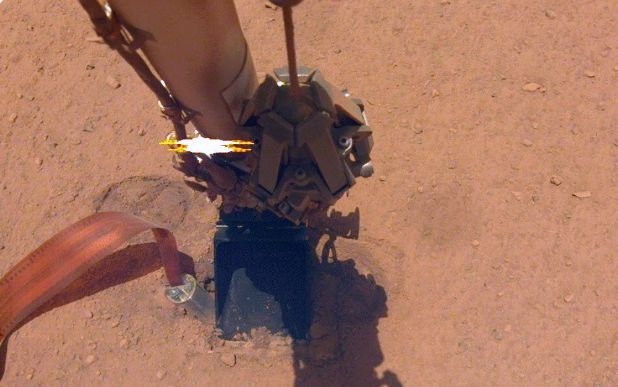The drill bit of the HP 3 installation of the InSight Martian station half jumped out of the ground during the next phase of recently resumed drilling operations. So far, experts cannot accurately say what happened, but it is believed that this is due to the properties of the soil in the well, the mission reported on Twitter.
Mars continues to surprise us. While digging this weekend the mole backed about halfway out of the ground. Preliminary assessment points to unexpected soil properties as the main reason. Team looking at next steps. #SaveTheMole #Teamwork pic.twitter.com/UURvU8VTwZ
— NASA InSight (@NASAInSight) October 27, 2019
HP 3 (The Heat Flow and Physical Properties Package) is one of the two main scientific tools of the InSight automated station, which since November 2018 has been studying the internal structure of Mars and geological processes in its depths. It was assumed that after placement on the ground near the landing platform, the instrument using a 40-centimetre drill will create a five-meter well, in which a loop with sensors that collect information about the thermal conductivity of various layers of the soil of the Red Planet should have been located. However, in early March of this year, the HP 3 suspended drilling operations, plunging into the ground by only 30 centimetres.
Initially, there were two versions of the reasons for what happened – the drill could collide with the stone or has little adhesion to the surrounding soil, which is why recoil during impacts is not balanced. The latest version was soon confirmed: the walls of the well expanded greatly due to the fact that the drill lacked friction, and it practically did not move deeper. Then an attempt was made using a small bucket, mounted on the end of a 2.4-meter IDA robotic arm (Instrument Deployment Arm), to compact the soil near the edge of the well, but this did not bring tangible benefits. After that, the engineers decided to gently press the drill itself to provide it with the necessary ground grip for work, which allowed it to go deep by almost two centimetres into the soil.
In the future, a series of blows were carried out, the drill again advanced a few centimetres deep, while the bucket was moved and increased the vertical load on the ground and the drill itself. It was noted that the speed of the drill is small, only about 0.1 millimetres per impact, which is an order of magnitude less than expected – it is assumed that the soil in the well is very compacted or similar to gravel. On October 26, 2019, two series of 150 blows were planned, but during their execution, the drill unexpectedly jumped out of the ground to half its length, which was recorded by the platform’s cameras. It is assumed that this is due to the mechanical properties of the soil in the well, a version of the presence of stone seems unlikely. Currently, drilling operations are again stopped, and specialists are considering a plan for further action.
The main working scientific tool of the station now remains the SEIS seismograph, which in April of this year recorded its first “marsquake”. Nevertheless, the device turned out to be too sensitive and prevents itself from exploring the planet’s seismic activity.
